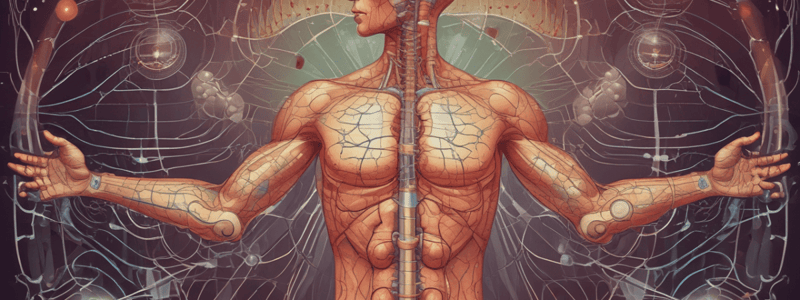Podcast
Questions and Answers
What is the effect of antidiuretic hormone (ADH) binding to V1 receptors in vascular smooth muscle?
What is the effect of antidiuretic hormone (ADH) binding to V1 receptors in vascular smooth muscle?
- Water retention
- Vasodilation
- Vasoconstriction (correct)
- Increased heart rate
What triggers the release of antidiuretic hormone (ADH) in response to changes in blood volume?
What triggers the release of antidiuretic hormone (ADH) in response to changes in blood volume?
- Decreased blood volume/hypotension (correct)
- Increased serum osmolality
- Increased blood volume
- Normal blood pressure
What is the effect of antidiuretic hormone (ADH) on electrolyte levels?
What is the effect of antidiuretic hormone (ADH) on electrolyte levels?
- No effect on electrolyte levels (correct)
- Increase in sodium levels
- Increase in potassium levels
- Decrease in potassium levels
What is the cause of central/neurogenic type of diabetes insipidus?
What is the cause of central/neurogenic type of diabetes insipidus?
What is the result of increased levels of antidiuretic hormone (ADH)?
What is the result of increased levels of antidiuretic hormone (ADH)?
What is the effect of antidiuretic hormone (ADH) binding to V2 receptors in the collecting duct of the nephron?
What is the effect of antidiuretic hormone (ADH) binding to V2 receptors in the collecting duct of the nephron?
What is the cause of nephrogenic type of diabetes insipidus?
What is the cause of nephrogenic type of diabetes insipidus?
What is the trigger for the release of antidiuretic hormone (ADH) in response to stress?
What is the trigger for the release of antidiuretic hormone (ADH) in response to stress?
Which of the following is a cause of SIADH?
Which of the following is a cause of SIADH?
What is the primary goal of treatment in Diabetes Insipidus?
What is the primary goal of treatment in Diabetes Insipidus?
What is the characteristic urine output in SIADH?
What is the characteristic urine output in SIADH?
What is the consequence of untreated Diabetes Insipidus?
What is the consequence of untreated Diabetes Insipidus?
What is the mechanism of V2 Receptor Antagonist in SIADH treatment?
What is the mechanism of V2 Receptor Antagonist in SIADH treatment?
What is the primary symptom of Diabetes Insipidus?
What is the primary symptom of Diabetes Insipidus?
What is the effect of SIADH on blood sodium levels?
What is the effect of SIADH on blood sodium levels?
What is the nursing problem associated with SIADH?
What is the nursing problem associated with SIADH?
What is the primary problem in Type 2 diabetes mellitus?
What is the primary problem in Type 2 diabetes mellitus?
What is the name of the type of hypersensitivity reaction that occurs in Type 1 diabetes?
What is the name of the type of hypersensitivity reaction that occurs in Type 1 diabetes?
What is the result of insulin resistance in the liver?
What is the result of insulin resistance in the liver?
What is the term for high blood sugar levels?
What is the term for high blood sugar levels?
What is the role of insulin in the body?
What is the role of insulin in the body?
What is the consequence of the cell not receiving glucose for fuel?
What is the consequence of the cell not receiving glucose for fuel?
What is the characteristic of the pancreas in Type 1 diabetes?
What is the characteristic of the pancreas in Type 1 diabetes?
What is the contributing factor to Type 2 diabetes that is heavily lifestyle-based?
What is the contributing factor to Type 2 diabetes that is heavily lifestyle-based?
What is fat considered to be, in addition to its role in storing energy?
What is fat considered to be, in addition to its role in storing energy?
What is a possible reason why obesity contributes to type 2 diabetes?
What is a possible reason why obesity contributes to type 2 diabetes?
What is the primary cause of hyperglycemia in diabetes?
What is the primary cause of hyperglycemia in diabetes?
What is the name of the test that measures average blood glucose control over the past 3 months?
What is the name of the test that measures average blood glucose control over the past 3 months?
What is the normal range for Hemoglobin A1C (HbA1c)?
What is the normal range for Hemoglobin A1C (HbA1c)?
What is the primary cause of polyuria in diabetes?
What is the primary cause of polyuria in diabetes?
What is the term for the process by which glucose combines with hemoglobin in red blood cells?
What is the term for the process by which glucose combines with hemoglobin in red blood cells?
What is the typical range of Hemoglobin A1C (HbA1c) in diabetic patients?
What is the typical range of Hemoglobin A1C (HbA1c) in diabetic patients?
What is the primary cause of long-term complications in diabetes?
What is the primary cause of long-term complications in diabetes?
What is a common symptom of diabetic neuropathy?
What is a common symptom of diabetic neuropathy?
What is a complication of diabetic retinopathy?
What is a complication of diabetic retinopathy?
What is a symptom of diabetic gastroparesis?
What is a symptom of diabetic gastroparesis?
Why do people with diabetic neuropathy have an increased risk of falls?
Why do people with diabetic neuropathy have an increased risk of falls?
What is a complication of diabetic nephropathy?
What is a complication of diabetic nephropathy?
Why is it important to control blood glucose levels?
Why is it important to control blood glucose levels?
What is a characteristic of long-term complications of diabetes?
What is a characteristic of long-term complications of diabetes?




